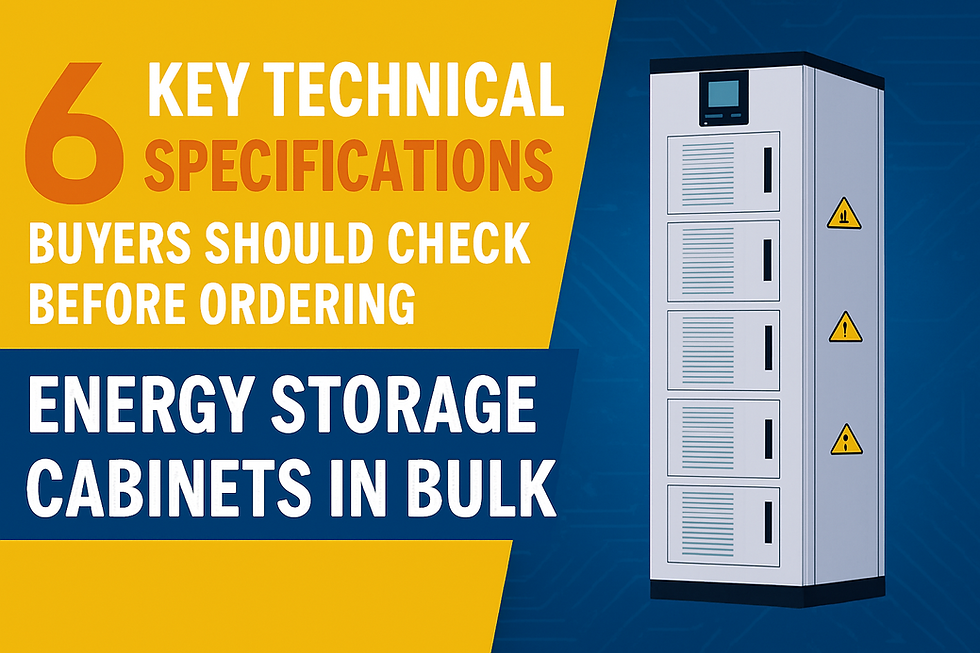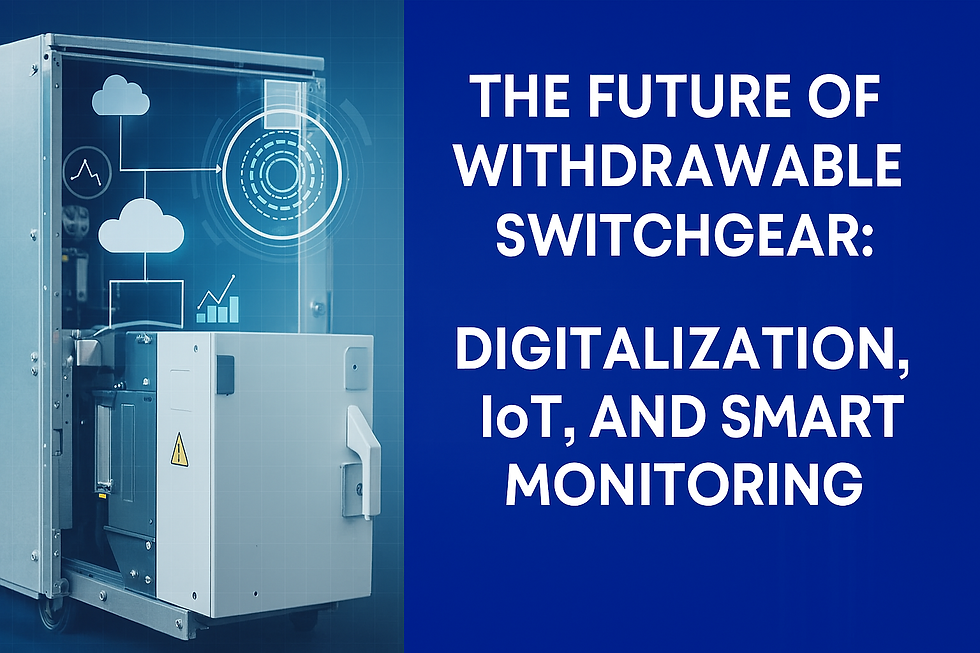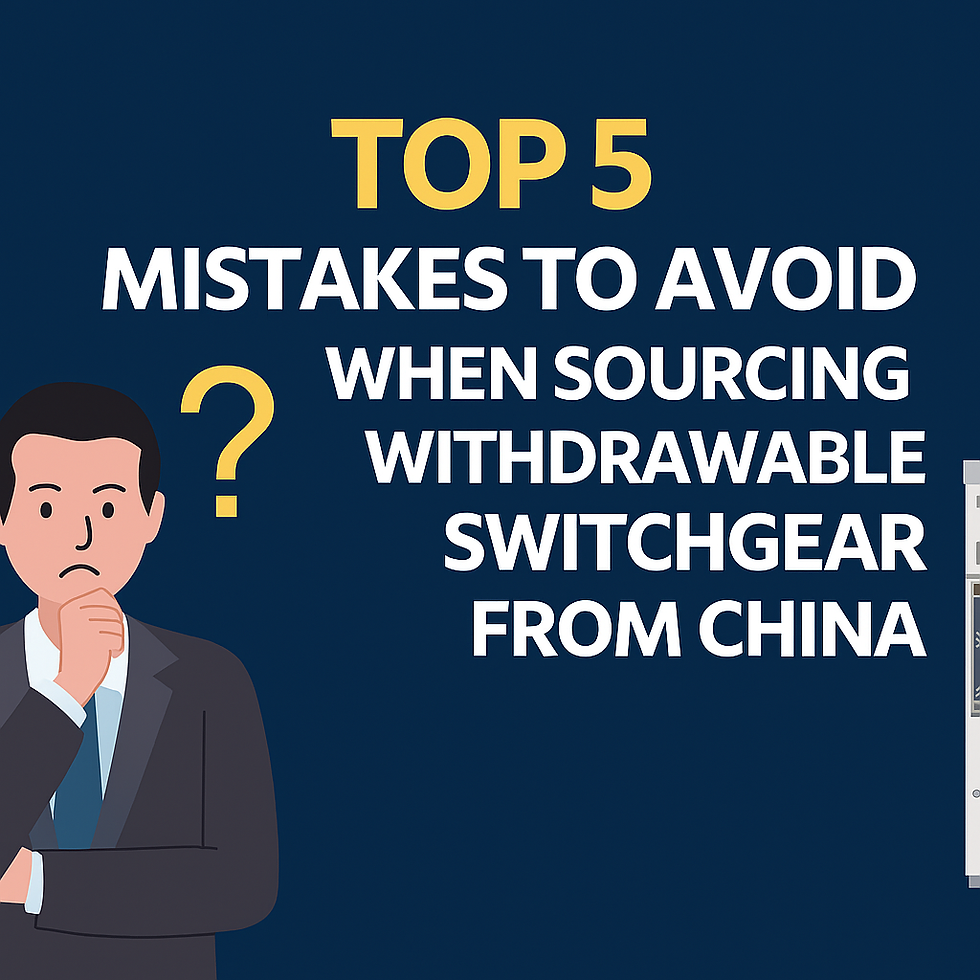6 Key Technical Specifications Buyers Should Check Before Ordering Energy Storage Cabinets in Bulk
- bzpowereq
- 2 days ago
- 5 min read

Buying an energy storage cabinet in bulk is an excellent way for businesses to reduce costs, streamline procurement, and support the growing demand for renewable energy integration. However, large-scale purchases also come with risks if buyers overlook crucial technical details. An energy storage cabinet is not just a container for batteries—it is a sophisticated system that determines how well your project will perform in terms of safety, efficiency, and scalability.
As renewable energy, microgrids, and industrial storage projects rapidly expand, the wholesale energy storage cabinet market has become more competitive than ever. Buyers who take the time to understand technical specifications before placing large orders can avoid costly mistakes such as downtime, compliance issues, or compatibility problems.
In this blog, we’ll explore six key technical specifications every bulk buyer should check before ordering wholesale energy storage cabinets.
Importance of Technical Specifications in Wholesale Energy Storage Cabinets
Technical specifications are not just numbers on a datasheet; they directly affect performance, lifecycle cost, and project safety. For businesses, overlooking these details can lead to equipment failures, warranty disputes, or regulatory non-compliance—all of which erode ROI.
When ordering wholesale energy storage cabinets, you’re not just buying equipment—you’re investing in infrastructure that must operate reliably for years. Focusing on the right technical specs ensures compatibility with project goals, regulatory requirements, and future expansion plans.
Ignoring specifications may save time in the short run, but it often leads to long-term costs such as unplanned maintenance, efficiency losses, or even system replacement.
Specification 1: Battery Chemistry Compatibility
One of the most critical considerations is the type of battery chemistry the cabinet supports. The two most common chemistries are:
Lithium Iron Phosphate (LiFePO4): Known for its safety, stability, and long cycle life, making it ideal for commercial and utility-scale applications.
Nickel-Manganese-Cobalt (NMC): Offers higher energy density, making it suitable for applications where space is limited but demands are high.
Selecting the wrong battery type can result in compatibility issues, reduced efficiency, or shorter lifespan. For example, a wholesale energy storage cabinet designed for LiFePO4 batteries may not be optimal for NMC cells due to differences in voltage profiles and thermal management requirements.
Key takeaway: Always verify that the cabinet design aligns with your preferred battery chemistry to ensure safety, efficiency, and long-term project success.
Specification 2: Energy & Power Rating (kWh / kW)
Understanding the distinction between energy capacity (kWh) and power output (kW) is essential when sourcing energy storage cabinets.
Energy capacity (kWh): Determines how much energy can be stored for later use.
Power output (kW): Indicates how quickly the stored energy can be delivered.
For example, a project supporting peak shaving in an industrial facility requires a cabinet with higher power output, while a renewable energy integration project may prioritize storage capacity.
When ordering wholesale, ensure your chosen energy storage cabinets match the project’s load profile. Oversizing leads to unnecessary costs, while undersizing can cause system failures and reduced efficiency.
Key takeaway: Always calculate the required balance of storage and output for your project before bulk orders.
Specification 3: Safety & Certification Standards
Safety and compliance are non-negotiable in large-scale energy storage projects. Wholesale buyers must demand certifications that prove the product meets international standards, such as:
UL (Underwriters Laboratories): Ensures compliance with North American safety standards.
CE Marking: Required for products sold in the European market.
IEC Standards: International safety and performance benchmarks.
UN38.3: Certification for the safe transport of lithium batteries.
Without proper certifications, bulk purchases may fail regulatory inspections, delaying project deployment and increasing liability. Additionally, insurance providers may refuse coverage for uncertified systems.
Key takeaway: Never compromise on certified products when procuring wholesale energy storage cabinets. Certifications protect both your investment and your reputation.
Specification 4: Cooling & Thermal Management Systems
Thermal management plays a crucial role in ensuring battery safety and extending lifespan. Poorly designed systems can lead to overheating, reduced efficiency, and even catastrophic failures.
Two common cooling methods are:
Air Cooling: Cost-effective and simple, suitable for environments with moderate climate conditions.
Liquid Cooling: More advanced, offering superior heat management in high-density or large-scale systems.
For bulk orders, buyers should consider the climate in which the cabinets will be deployed. An air-cooled system may suffice for indoor installations, but outdoor or large-scale deployments often demand liquid cooling to maintain safe operating temperatures.
Key takeaway: Choose a thermal management system aligned with your project’s scale, location, and operating conditions.
Specification 5: Enclosure Design & Protection Rating (IP Rating)
The enclosure design of an energy storage cabinet significantly influences its durability, particularly when installed in challenging environments. A strong enclosure protects sensitive electronics from dust, moisture, and temperature fluctuations.
The IP (Ingress Protection) rating is the industry standard:
IP54: Basic protection against dust and splashing water, suitable for indoor settings.
IP65 or higher: Offers robust protection against dust and water, making it suitable for outdoor installations or harsh environments.
Bulk buyers should also evaluate enclosure materials—such as stainless steel or powder-coated aluminum—that offer corrosion resistance and long-term durability.
Key takeaway: Always check the IP rating and material design of wholesale energy storage cabinets to ensure resilience in the intended environment.
Specification 6: Scalability & Integration Capabilities
Energy storage is rarely a one-time investment. Most projects expand over time, which makes scalability a vital specification. Wholesale buyers should prioritize modular cabinet designs that simplify expansion without major system overhauls.
Equally important is the cabinet’s integration capability:
BMS (Battery Management System): Should support monitoring, balancing, and fault detection.
Grid Compatibility: Ensure compliance with local grid codes for seamless integration.
EMS (Energy Management System): Capability to integrate with renewable sources, smart grids, or microgrid setups.
Without these features, expanding or upgrading your system becomes costly and complex.
Key takeaway: A scalable, integration-ready design ensures long-term value from your bulk investment.
Additional Considerations for Wholesale Buyers
Beyond technical specifications, wholesale buyers should also evaluate:
Warranty & After-Sales Support: Ensure coverage for performance, defects, and technical service.
Vendor Reliability: Check supplier track record, production capacity, and client references.
Cost vs. Quality Trade-Offs: Lowest price does not always mean best value. Consider lifecycle costs, not just upfront savings.
These factors often determine the long-term success of your wholesale procurement strategy.
Conclusion
Ordering an energy storage cabinet in bulk offers significant cost advantages, but only if buyers carefully evaluate technical specifications. From battery chemistry compatibility to scalability and integration, each factor influences the safety, efficiency, and profitability of your investment.
By focusing on these six key specifications—and not overlooking warranty, supplier credibility, and compliance—businesses can secure wholesale energy storage cabinets that deliver long-term value.
When it comes to large-scale energy storage, cutting corners is never worth the risk. The right supplier, combined with informed decision-making, ensures that your projects remain safe, efficient, and future-ready.




Comments